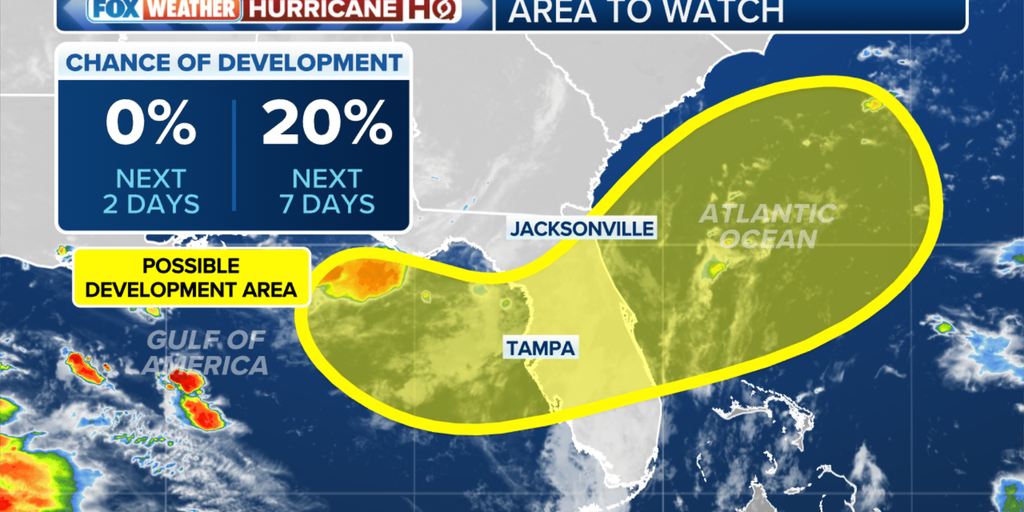Possible Tropical Development Could Impact July Fourth Travel Plans
As millions of Americans prepare for the upcoming July Fourth holiday weekend, the swirling waters off the Southeast coast of the United States may host more than just vacation dreams. The National Hurricane Center (NHC) has identified a developing system of low pressure that could impact holiday travel plans for a record-setting 72.2 million people expected to be on the move.
A Growing Concern Off the Southeastern Coast
The NHC recently announced that remnants of a frontal boundary may lead to the formation of a tropical or subtropical system near the Atlantic or Gulf coasts by week’s end. As forecasters ponder the implications, travelers eyeing sun-soaked beaches and festive barbecues find themselves faced with an uncertain weather forecast.
“We are currently observing a low chance of development,” remarked Dr. Elena Ramirez, a meteorologist with the National Oceanic and Atmospheric Administration. “However, it’s critical for travelers to monitor updates, as even minor systems can introduce unpredictable weather patterns.”
The Timing is Crucial
The timing of this development couldn’t be more pivotal. With July Fourth falling on a Friday this year, travel experts predict a weekend jam with millions taking advantage of the extended time off. According to AAA, this could lead to the busiest holiday travel in years, attributing the rise to improved economic conditions coupled with pent-up demand from previous travel restrictions.
- Potential impacts observed include increased precipitation along the Southeastern coast.
- Travel delays are likely as holiday traffic intersects with evolving weather conditions.
- Emergency services may need to remain on high alert for rapidly changing circumstances.
“This is a classic example of how tropical systems don’t just affect those who live on the coast,” stated Professor Martin Liu, an atmospheric scientist at the University of Florida. “The ripple effect often reaches far beyond localities, potentially influencing travel plans as far inland as major metropolitan areas.”
Understanding the Atmospheric Dynamics
The development of tropical or subtropical systems is primarily influenced by atmospheric conditions, including temperature, moisture, and wind patterns. The NHC noted that a gradual drift of this system offshore may lead to enhanced humidity, paving the way for intense rainfall and the possibility of minor storm developments.
“While the initial chance of significant development is low, atmospheric conditions can change rapidly, creating substantial impacts on both the environment and society,” warned Dr. Rachel Kim, an expert in climatology with the Global Weather Institute. “It’s essential for the public to stay informed.”
Data-backed Predictions
Recent studies indicate that systems originating from the Southeastern U.S. can often escalate unexpectedly, demonstrating rapid growth within just a few days. Data collected from NOAA over the past decade reveals that 35% of tropical systems formed during peak vacation seasons exhibit this unpredictable behavior.
“The historical data suggests that even those systems with a low probability have caused unexpected delays or severe weather,” added Dr. Kim. “Travelers should prepare for the unexpected, especially during pivotal holiday weekends.”
Practical Tips for Travelers
As the Fourth of July approaches, travelers are advised to take the following precautions to ensure safety and minimize disruptions:
- Regularly check weather updates from reliable sources.
- Have contingency plans in place for travel delays or cancellations.
- Consider flexible accommodation options to adapt to changing conditions.
- Stay informed about potential safety warnings or emergency declarations.
In an age where weather can pose significant risks to holiday plans, travelers are encouraged to harness technology to aid in decision-making. Mobile apps and weather alerts can provide real-time updates that might inform travel routes or even prompt a change of destination.
The Bigger Picture
The increased likelihood of weather-related disruptions during peak travel seasons highlights an ongoing dialogue about climate change and its effects on annual weather patterns. As noted in a comprehensive study by the Environmental Research Center, the rise in sea surface temperatures is leading to both the frequency and intensity of weather systems around the globe.
“If current trends continue, we may have to rethink how we approach travel during peak seasons—particularly as holiday celebrations become overshadowed by the unpredictability of tropical developments,” remarked Professor Liu.
With millions poised to celebrate independence and embrace the joys of summer travel, this year’s July Fourth holiday is a potent reminder of how nature can orchestrate unforeseen challenges. For many, the thrill of catching fireworks may come with a side of weather uncertainty, urging travelers to be ever-vigilant, adaptable, and informed.





